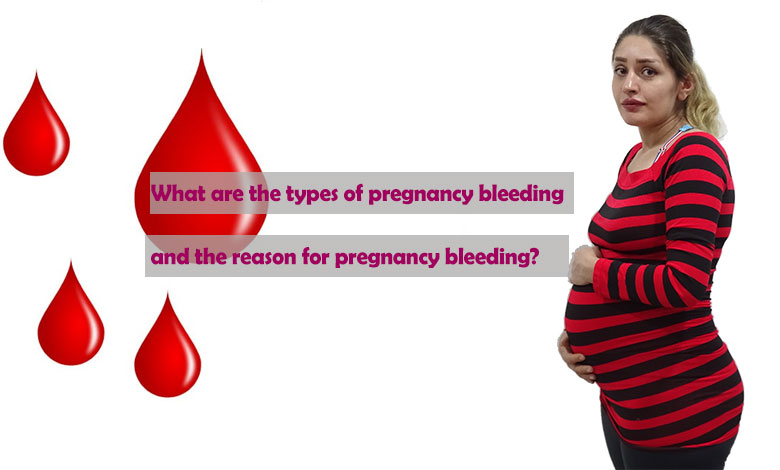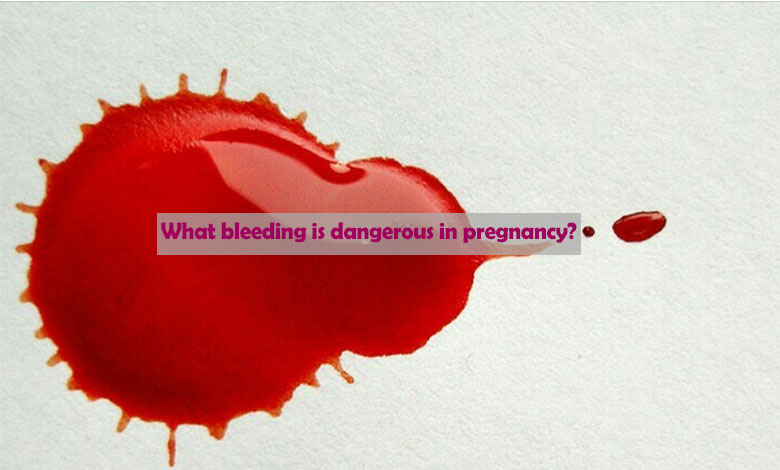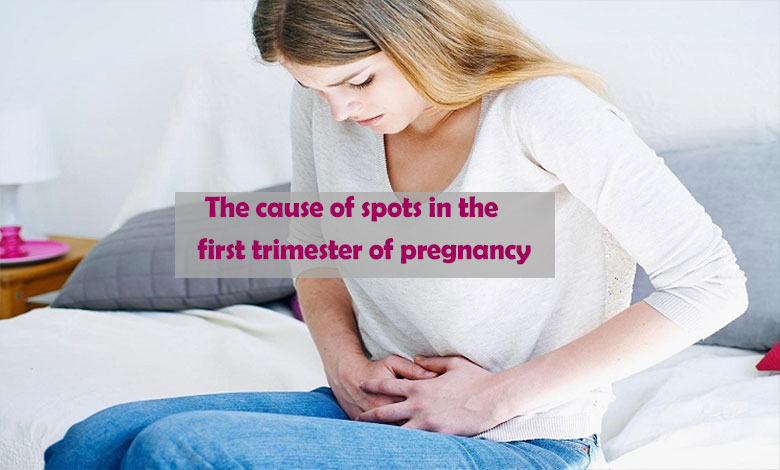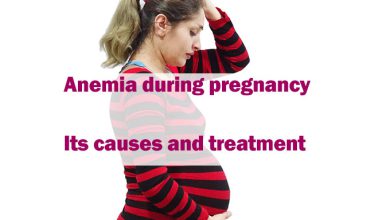What are the types of pregnancy bleeding and the reason for pregnancy bleeding?

Spotting and bleeding during pregnancy are common complications for many women. Several causes cause this complication and affect its duration and severity. Then the bleeding can last a day or several days.
Pregnant women who experience spotting or bleeding are often worried and scared and ask these questions; How many days is spotting normal during pregnancy? How many days does bleeding last during pregnancy? What is the sign of pregnancy bleeding?
It is very important to know the normal duration of spotting and bleeding because when the bleeding is severe or its duration is prolonged, measures can be taken to prevent the occurrence of the danger and save the life of the mother and the fetus.
Related posts: main reasons for abortion and ways to treat it
What is the difference between spotting and bleeding in pregnancy?
The difference lies in the color of the bleeding in pregnancy and its intensity. Spotting is light bleeding from the vagina and if you are wondering what color spotting is during pregnancy, you should know that it can be seen as brown or pink. But when the bleeding is bright red, it is usually more severe and the cause of its occurrence is different from the cause of pregnancy spotting.
What bleeding is dangerous in pregnancy?
You may also wonder if bleeding is dangerous in the first month of pregnancy. What about spotting in the first month of pregnancy?
In this, we have to say that bleeding during pregnancy is a common thing, but it makes pregnant mothers very concerned about their health and the health of the fetus. Bleeding in the first month of pregnancy and in early pregnancy is painless, mild, and in the form of spots.

This type of bleeding is usually not dangerous and is caused by changes in the pregnancy, but if the bleeding is in the last trimester of pregnancy, especially in the 9th month, it can present serious risks.
What is the symptom of pregnancy bleeding?
Bleeding in pregnancy has several causes, some are serious and some are minor and will resolve soon. To find out what causes pregnancy bleeding, let’s look at different factors based on the individual months of pregnancy.
The cause of spots in the first trimester of pregnancy
The first trimester of pregnancy is associated with spotting in one-third of women. Spotting does not cause miscarriage or endanger the mother’s life and usually disappears after a few days. Causes of spotting in the first three months of pregnancy include the following.
-
Embryo implantation
After being fertilized and staying in the fallopian tube for 3 days, the egg is transferred to the uterus and attaches itself to the uterine wall.
This condition occurs 6 to 12 days after ovulation and is called implantation bleeding. Implantation is accompanied by symptoms of breast tenderness, muscle cramps, and spotting.
A common cause of menstrual-like bleeding in the early weeks of pregnancy is implantation. Implant spotting is mild. If you have a question, what color is the implanted flow? Implantation-like spotting or bleeding with the color of menstrual blood is seen in pregnancy.
During implantation, the blood that is the result of fertilization and sperm formation does not come out soon, and this blood comes out gradually, but the maximum time for it to come out is three days, and spotting usually does not last longer than this time. But if it lasts more than this time or becomes severe, it needs serious attention and referral to a gynecologist.
-
Ectopic pregnancy
Cases in which the egg is fertilized outside the uterus and cannot implant itself in the uterus are called ectopic pregnancies. The most common place for an ectopic pregnancy to occur is the fallopian tubes. The symptoms of this condition are bleeding during pregnancy and lower abdominal pain.

-
Sex
Blood capillaries block the beginning of the cervix and during pregnancy, more blood flows into the uterus and into these capillaries. If pressure is applied to this area during intercourse, the cervix will become irritated and spotting will occur. The amount of this spotting is usually not severe and disappears after a few hours.
– Physical examination
Pelvic exams are performed between the sixth and twelfth weeks of pregnancy, which can cause spotting for up to 24 hours and is safe for the mother and fetus.
-
Infection
Infectious agents in the vagina and uterus or a complication such as a cold sore cause bleeding. The infection can be due to sexually transmitted diseases such as chlamydia.
-
Subcortical bleeding
During pregnancy, blood accumulates in the layers of the chorion, the outer membrane of the fetus, next to the placenta and inside the placenta. This pooling of blood may not cause problems, but in some cases, it bleeds and cause complications.
-
Abortion
The first 12 weeks of pregnancy are more prone to miscarriage than other times and are often accompanied by cramping or abdominal pain. If bleeding occurs, you should see your abortion doctor as soon as possible.
-
Cervical polyps
Some women have cervical polyps before pregnancy and don’t know about it. These people bleed during pregnancy with sex. This bleeding has nothing to do with pregnancy and is not dangerous.
The cause of bleeding in the second and third trimesters of pregnancy
The possibility of pregnancy bleeding decreases in the second and third trimesters of pregnancy, however, if the bleeding occurs in the fourth month of pregnancy and later, its complications and damages are more. The following are the causes of bleeding in the second and third trimesters of pregnancy.
-
Pair on the way
The fetus is connected to the placenta through the umbilical cord and receives nourishment from the mother’s body. Placenta placement is in the upper half of the uterus. If a situation occurs and the placenta is placed in the lower half of the uterus and blocks the opening of the uterus and prevents the fetus from being delivered, this condition is called pair on the way.
Preeclampsia is characterized by painless bleeding and dilation of the cervix. It usually causes no complications to either the fetus or the mother unless the placenta is disturbed and the fetus is unable to feed itself. In the ultrasound from weeks 16 to 20 of pregnancy, the placenta can be identified and its complications and bleeding can be prevented.
If this complication occurs before 37 weeks, the mother receives corticosteroids to complete the development of the fetal lungs. However, at 37 weeks, if there is still viscous bleeding during pregnancy and it has not stopped, a cesarean section is performed.
-
Premature separation of the placenta
Separation of the placenta must occur during delivery. If the placenta separates before delivery, this condition is called decollement and is the most common cause of bleeding.
- Increased fetal heart rate
- Increased intensity and uterine contractions
- Stomach ache
- premature birth
Giving birth before 37 weeks without ruptured water of the sac is called preterm birth. The most important symptom of preterm birth is heavy bleeding. Bleeding in the seventh month of pregnancy is mostly due to premature birth. The following symptoms indicate the onset of premature labor.
- More than 5 uterine contractions per hour.
- Severe pressure in the pelvis.
- Swelling of the face and hands.
- Clear, watery secretions and clear blood from the vagina.
- Pain when urinating
- Long back pain and stomach pain.
- Vomit
- Severe pelvic pressure
- The causes of premature birth are as follows.
- Multiple pregnancies
- The short interval between pregnancies
- Cervical weakness or short cervix
- Uterine infection
- Unhealthy lifestyle with smoking or drug addiction
- Underweight or overweight
- Coronary arteries
The blood vessels that supply the fetus without the protection of the umbilical cord are found in the lining of the uterus and pass through the entrance canal of the uterus. Although the possibility of these vessels rupturing is very low, when vessels rupture, the blood supply to the fetus is reduced. Symptoms of peripheral vascular rupture are abnormal fetal heart rate and heavy bleeding.
What should we do when faced with bleeding during pregnancy?
Bleeding during pregnancy creates anxiety for the pregnant mother and those around her, so it is about providing conditions to reduce bleeding during pregnancy. These conditions include care and changes in sexual lifestyle and changes in the diet of pregnant women.
- Keep calm and don’t stress yourself.
- Rest and do not engage in strenuous activities.
- Do not use a tampon while bleeding and replace it with a pad.
- Don’t have sex while you’re bleeding.
- Take your medicines as prescribed by your doctor. One of the medications used for pregnancy bleeding is paracetamol.
What foods stop bleeding in pregnancy?
Also, in response to those who ask what to eat to stop bleeding during pregnancy, we present the following foods for home treatment of spotting during pregnancy.
The first and most important point is that no food can completely stop the bleeding. However, since the mother can lose a lot of blood, it is possible to strengthen the body and restore health by consuming healthy foods. The following vitamins and nutrients should be included in the diet of a person who is bleeding.
- Iron-containing foods, such as red meat, dark green leafy vegetables, prunes, sherbet eggs, parsley
- Increase your vitamin C consumption for better iron absorption.
- Rich sources of vitamin C include oranges, limes, and other citrus fruits.
- Apples, pears, pomegranates, etc.
- Raisins are dried fruits that are useful for strengthening a pregnant mother who is bleeding.
What foods are harmful to bleeding in pregnancy?
The use of the following foods causes bleeding during pregnancy. It is even recommended that pregnant women do not use these foods.
- Bitter almond
- Citrus aurantium
- Garlic
- Saffron
- Barberry
- Medicinal plants such as thyme, clover, mint, licorice, Khatami, Zenia, and oregano
When should we see a doctor?
Finding the cause of pregnancy bleeding and treating pregnancy bleeding is the doctor’s duty. By examining the cervix, the doctor checks the degree of opening and the possibility of miscarriage controls the fetal heartbeat with ultrasound, then begins drug therapy and treatment depending on the cause and amount of bleeding.

- In some cases, it recommends hospitalization and absolute bed rest for the mother and may prohibit sexual intercourse in the first month of pregnancy or may announce the termination of pregnancy.
- In order to have a safe pregnancy and prevent bleeding complications in pregnancy, it is urgent to consult a doctor if the following symptoms appear.
- Implantation discharge in the first days of pregnancy should not be mild and last more than 3 days.
- The bleeding is still visible one week after intercourse.
- Bleeding or staining with bad smell and itching.
- If accompanied by abdominal pain or blood clots during pregnancy, the fetus may be miscarried.
- Fever, chills, and bloody discharge are signs of infection.
- The appearance of nausea and tender breasts is a sign of diminished pregnancy symptoms and is dangerous.
What are the most common causes of bleeding during the first trimester of pregnancy?
Causes of first-trimester light bleeding or spotting that is not harmful to you and your baby include :
- Implantation
- Cervical polyps
- Uterine infections
- Yeast infections
- Carrying multiple babies
What are the 2 main reasons for bleeding during pregnancy?
What is the difference between normal bleeding and pregnancy bleeding?
Is pregnancy spotting related to the gender of the fetus?
How much bleeding is normal in early pregnancy?
Conclusion
In conclusion, pregnancy bleeding can be a concerning symptom for expectant mothers, as it may indicate a potential complication with the pregnancy. There are several types of pregnancy bleeding, including implantation bleeding, first-trimester bleeding, and third-trimester bleeding, each with its own set of possible causes and risk factors.
Some common causes of pregnancy bleeding include hormonal changes, implantation, ectopic pregnancy, miscarriage, placenta previa, and placental abruption. It is important for individuals who experience any type of pregnancy bleeding to seek medical attention promptly, as early diagnosis and treatment can help prevent serious complications.
Further research is needed to better understand the causes and risk factors associated with pregnancy bleeding, as well as the most effective management strategies for this condition. Overall, being aware of the types and reasons for pregnancy bleeding can help individuals make informed decisions about their health and pregnancy status.
